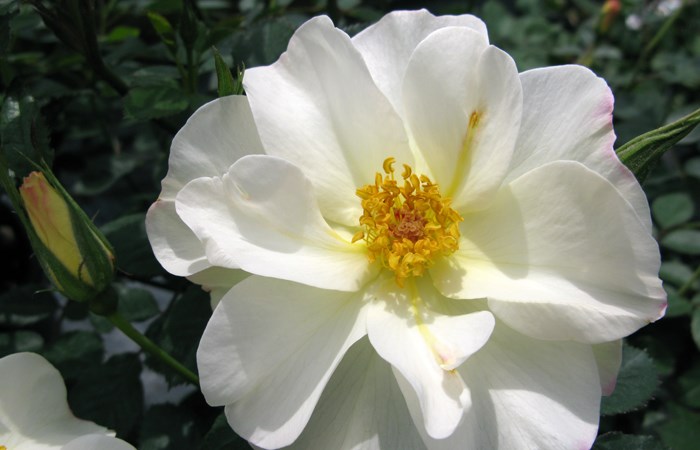Shakespeare famously penned, ‘that which we call a rose by any other name would smell as sweet.’ He could have used any other flower to make his point, but he chose rose because he knew it would evoke a familiar sensory experience in his 16th Century audience. So it is true today – the rose is one of the most recognized flowers and floral scents in the world and has been since ancient Greek and Roman times. As both a cut flower (especially on Valentine’s Day) and garden plant, roses are big sellers. The drawback for Prairie gardeners in the early days was a lack of cold hardiness and repeat blooming. And roses can be particularly susceptible to leaf diseases, especially in wet years.
Early Prairie rose breeders like Percy Wright, George Bugnet and Frank Skinner made important hardy rose introductions, some of which are still available. However, the better-known Canadian hardy roses came from two Agriculture and Agri-Food Canada (AAFC; then Dominion Department of Agriculture) breeding programs that produced the Parkland Series (e.g. ‘Morden Fireglow’, ‘Winnipeg Parks’) and the Explorer Series (e.g. ‘John Cabot’, ‘John Franklin’, etc.). The goal of AAFC’s program was to develop hardy, long-blooming and disease resistant climbing and bush roses that resembled tender European hybrid tea and floribunda roses. The Parkland roses were especially adapted for life on the Prairies, while the Explorer roses were better suited for hot, humid Central Canada (i.e. ON and QC); there were several cultivars that would survive in both regions.
Sadly, due to changing mandates, retirements and reduced budgets, the AAFC rose breeding programs were discontinued. Fortunately, all was not lost. The rose germplasm or breeding stock was not discarded. In the early 2000s, the germplasm was initially licensed to the Rose Consortium under the direction of two former AAFC rose breeders. They evaluated the 1000s of hybrids and selected superior plants that were disease resistant, suitable for across Canada, more fragrant than previous selection and great performance. These were the first of the Canadian Artist Series with the most recent introduction this spring with the ‘Oscar Peterson’, a semi-double white shrub rose.
In 2010, the Canadian Nursery Landscape Association obtained the license for AAFC rose germplasm and then developed an agreement with the Vineland Research and Innovation Centre (Vineland, ON) to continue to develop hardy and disease resistant roses for the Canadian market with potential for other northern regions (e.g. Scandinavia and eastern Europe). Their program is ambitious, with staff making about 15,000 controlled crosses every year. Seedlings are first screened for black spot resistance.
These are further evaluated for powdery mildew resistance. Both are serious foliar diseases and plants, even with the most spectacular flowers, are unattractive with diseased leaves. The best seedlings, less than one percent of the 15,000 are evaluated at partner nurseries across Canada, from British Columbia to New Brunswick. The University of Saskatchewan, in one of Canada’s coldest urban centres, is also host to one of the evaluation sites. After two or three years of vigorous field testing without winter protection or fungicide treatment, only a couple of the best performers will make it to market. These then will have excellent disease resistance, be adaptable to all climatic region across Canada and, obviously, have superior flowering performance, dark glossy green leaves and great overall appearance.
To learn more about rose care and the Vineland rose breeding program as well as a tour the rose trial garden at the University of Saskatchewan, register for a free workshop on August 22, 4:00 – 5:30 by calling 306-966-5539 or go online at https://ccde.usask.ca/gardening/workshops.
This column is provided courtesy of the Saskatchewan Perennial Society (www.saskperennial.ca; [email protected]; www.facebook.com/saskperennial). Check out our Bulletin Board or Calendar for upcoming garden information sessions, workshops, tours and other events: August 28, Forestry Farm House-walking tour and open house, FREE with gate entrance fee (http://www.fffh.ca, 306-652-9801).
GardenLine (http://gardenline.usask.ca) is here until September 1 to help solve your gardening glitches. FREE. Phone 306-966-5865 or email [email protected].




